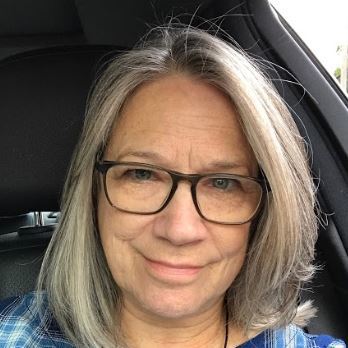This first week of Advent welcomes us to a season of anticipating and waiting for the inbreaking of God. But it is not a passive waiting—it is an open-eyed, bated-breath expectancy, an impulse to look in even the darkest corners and most unexpected places for sparks of divinity. Here, chaplain Kae Eaton, with help from Jessica Dexter, writes about how the Incarnation informs her work in Mental Health Chaplaincy, and about holding a posture that affirms the dignity and humanity of all people.
We originally shared this post as the first entry in our 2018 Advent email series. If you haven’t yet, you can sign up for that series here.
Incarnation as Mutuality
The incarnation was an act of mutuality. God became incarnate in order to deepen connection and relation with humanity. Such an act offered an opportunity for God and God’s people to come together in love and dignity, to work together for a better future for all of humanity. As participants in this sacred relationship, our work in the world must also begin with the notions of dignity and mutuality. Regardless of status, mental capacity, or moral failure, Jesus sought to be deeply present with all persons he encountered. He acted out of the compassionate nature within all of us. As man, and as divinity, he modeled a way of life that acted to remove the weight of shame, bringing peace and healing.
Only recently have I come to realize that we can embody the incarnation within ourselves. By seeking to listen beyond words and be present beyond the physical, we can begin to recognize unspoken cries and tend to unsurfaced wounds. When we begin to embody the incarnate divine in this way, we can then also acknowledge and empower the divine potential within others—an incarnational act in itself.
There is beauty and strength in the vulnerability of incarnational presence. We share the land, the experience of joy and suffering, and the capacity to hope for a future with color and meaning, and we can also share the divine power we hold within ourselves. After all, the divine incarnation was itself a gift of new hope and greater purpose.
“There is beauty and strength in the vulnerability of incarnational presence.”
Our work as Mental Health Chaplains begins with the notion of dignity and mutuality intact. Regardless of the situation, the mental capacity, or even the sense of moral failure, we are all of us sharing common space, our spirits incarnate with one another in this present moment, with the capacity to live and be in this world with hope for a meaningful existence.
Dignity in Advent
Alexa lived in the community center parking lot. She was a peaceful presence, but a hoarding one, and the people of the Temple next door, though kind, were running out of patience when the director of the center called for advice. Her belongings were beginning to spread along the path between the two buildings, and by the time I arrived there were carts heaped up and bags piled on benches, though not blocking the way.
The community extended care through an emergency shelter at the Temple and a weekly meal, and Alexa had found safety there, but the weather was turning and it was having an impact on her health and mental stability. She was now unwilling to be in the shelter, feeling trapped, and the system was ineffective in offering permanent housing, though she was an older woman. In this situation there was little to do except be present to her in the here and now.
When I first arrived at the community center she moved toward me, eyeing me carefully. She knew the director had called the Chaplain. I said hello and offered her my hand and my name. She responded saying that she wanted to talk with me but had things she needed to take care of. Perhaps she would have more time later. The director greeted me, noting the exchange, and we talked about staff concerns, security issues, and most importantly, the community’s desire to help her. But regardless of their motivation and desire, she remained reticent about meeting with the social service agency.
When I returned at that ‘better time,’ Alexa and I sat across from each other in the corner cafe drinking coffee, and I wondered about the ways she needed help. I had learned she was beginning to decompensate with delusions and occasional aggressiveness, convinced the area was her home. She was unconcerned about material realities, and I was surprised when she told me she’d been thinking about this time together. This is what our conversation revealed:
I noticed first how fair and beautiful her skin was. There was a softness that belied the constant exposure to the weather. The pale color of her face encircled a clear, direct, and steady gaze. I was sitting with a beautiful, intelligent woman full of dignity. I came to realize that her resistance and belligerence with items on the bench and the widening of the boundary lines along the walkway was the claiming of personal space, and the scheduling of a private conversation with me on her own terms was about dignity. What I might consider a lack of social and personal awareness or appropriateness was her cry for legitimacy. At this moment in her life, she saw this space as her home, and I needed to respect that.
“What I might consider a lack of social and personal awareness or appropriateness was her cry for legitimacy.”
This value of legitimacy became increasingly apparent throughout the random monologue with its consistent return to a singular point. I had only to listen long enough. The facts of her history were linked to the cries of her soul, and they revealed a beauty of language that held poetic impact. She showed me her writings and collection of short stories. She shared concerns about a friend on the street. She revealed that she had been a youth minister in a church in Eastern Washington but never let anyone know that she had become homeless. It was a long conversation, and, in truth, after over an hour I was beginning to get distracted by my sense of her physical need and the fact that we were no closer to finding her material help.
Unperturbed, she continued to talk and after another 20 minutes I began to wonder: is she keeping me here for the sake of company, or have I missed something she is trying to communicate? I listened harder. It is often the case that the gem comes as you are about to go your separate ways.
Alexa brought up again her experience as a minister in the community in which she never revealed that she was homeless, and instead said she had moved to another city. What she needed to share with me was stated simply:
“When you are a person without a home, people listen to you differently than if you were not homeless.”
“Yes,” I nodded. “And it’s wrong. Very wrong. And completely unfair.”
And she wept.
In a moment I understood what her true need was—the recognition of her dignity in spite of her circumstances.
I think of how undignifying it was for Mary to find her way to a stable to birth her child. And I think of how dignifying the Act of Incarnation was, and is, for God to become physically present to us on our wandering, displaced, and painful journey.
The presence, life, and death of Jesus centered around uniting with humanity. Regardless of status, mental capacity, physical ability, or moral failure, Jesus sought genuine relationship with all those he encountered and even resisted those who attempted inauthentic relationship. In truth, he embodied the compassionate nature within each of us. As a man, and as the divine, Jesus acted in compassion to remove the weight of shame, bringing peace and healing to the humiliated and dehumanized.
May we find and share dignity throughout this time of Advent Waiting.
Authors
 Kae Eaton is Chaplain and Executive Director of the Mental Health Chaplaincy, working with individuals and families experiencing mental illness or homelessness in Seattle and throughout the Northwest.
Kae Eaton is Chaplain and Executive Director of the Mental Health Chaplaincy, working with individuals and families experiencing mental illness or homelessness in Seattle and throughout the Northwest.
Kae holds a Masters in Theology, with emphasis in Counseling Psychology, and a Certificate in Spiritual Direction from The Seattle School of Theology & Psychology. She was 2018 Chaplain Fellow at the Center of Excellence in Substance Abuse Treatment and Education (CESATE), one of only two nationally, at the Veterans Administration, Puget Sound Healthcare System, and 2017 Chaplain Resident on the Acute Psychiatric Care Unit at the VA Hospital.
Kae also serves as Consultant and Master Trainer for Pathways to Promise, a national cooperative of mental health organizations and faith groups working with those with mental and emotional illnesses and their families. Kae has years of experience on the streets of Seattle not only working directly with people living without homes and dealing with mental health issues, but also training others in the Practices of Companionship through outreach and ministries of hospitality. Kae’s work and trainings support both secular and faith-based communities locally and nationally. She practices her faith in the St. Paul’s Episcopal Parish in Seattle.
 Jessica Dexter is Associate Chaplain and Administrative Assistant for the Mental Health Chaplaincy (MHC). Jessica’s administrative work helps to ensure the day-to-day operations of the MHC, and her chaplaincy work is directly with people facing issues of homelessness, mental illness, and isolation. She assists both the MHC and the various communities in partnership with the MHC. Jessica also works as Administrative Program Consultant for Pathways to Promise, managing the development and implementation of the Companionship program expansion nationwide.
Jessica Dexter is Associate Chaplain and Administrative Assistant for the Mental Health Chaplaincy (MHC). Jessica’s administrative work helps to ensure the day-to-day operations of the MHC, and her chaplaincy work is directly with people facing issues of homelessness, mental illness, and isolation. She assists both the MHC and the various communities in partnership with the MHC. Jessica also works as Administrative Program Consultant for Pathways to Promise, managing the development and implementation of the Companionship program expansion nationwide.
Jessica holds an MA in Theology & Culture from The Seattle School. She has lived in Rwanda, studying genocide and peacebuilding, which significantly impacts her academic and professional work. Through her work with perpetrators of the Rwandan Genocide of 1994, (formerly) incarcerated people, veterans, and people living in homelessness, Jessica has deepened her passion to serve her community. It is her belief that the divine exists within compassionate relationships and mutual human connection.

